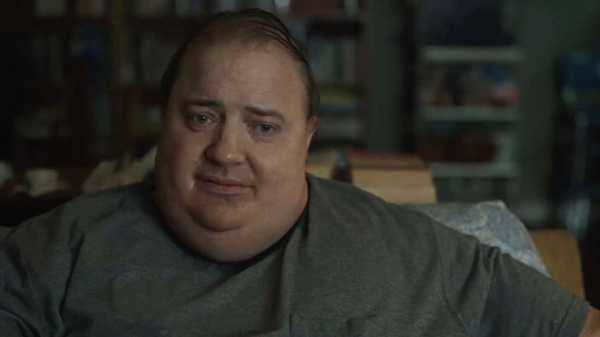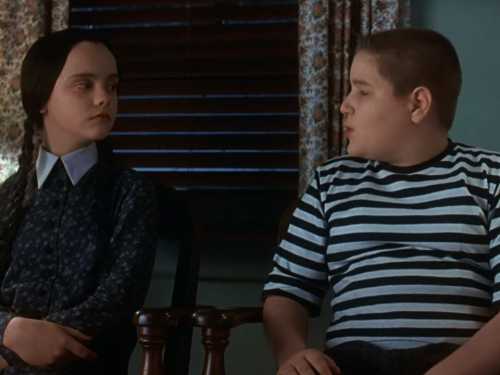
The new film “The Whale,” which A24 will release on Friday, is about a man named Charlie. He lives alone in a squalid apartment in Idaho, grieving a male lover, and is estranged from his ex-wife and teen daughter. His only companions are a nurse and a young evangelist who shows up at his doorstep. Charlie teaches an online essay-writing course, but he keeps his computer camera off out of shame, because he weighs around six hundred pounds.
Charlie is played by Brendan Fraser, beneath folds of photorealistic prosthetic fat. When I saw the film at the Toronto International Film Festival, in September, Fraser came onstage afterward, alongside the director, Darren Aronofsky, to an avalanche of applause. At fifty-three, Fraser was heavier than in his heartthrob days, though nothing close to his character in “The Whale.” He seemed almost befuddled to be embraced so warmly, after years of neglect from Hollywood. In a 2018 GQ profile titled “What Ever Happened to Brendan Fraser?,” he described falling into a depression after being groped by Philip Berk, the former president of the Hollywood Foreign Press Association. (Berk denied the allegation.) The support for Fraser in Toronto was palpable, and he now stands at the front of the Academy’s Best Actor race, with two time-tested Oscar narratives behind him: the comeback and the deglamorizing “transformation.”
But, as endearing as Fraser was, the lovefest left me uneasy. I wasn’t alone. “This is a mighty act of becoming, the film seems to insist—and also one of empathy,” Vanity Fair’s Richard Lawson wrote, of Fraser’s onscreen transformation. “But what’s expressed instead is a kind of leering horror, a portrait of a man gone to catastrophic ruin so that we, in the audience, may tap into our nobler, higher minds and see the worthy human being beneath the frightful exterior.” The film is adapted from a play by Samuel D. Hunter, which I first read a decade ago, before its acclaimed Off Broadway run, at Playwrights Horizons, starring the actor Shuler Hensley in a bulbous bodysuit. (The New Yorker’s John Lahr, in his review, praised Hunter’s “promise as a bold theatrical storyteller.”) On the page, the play transported me into Charlie’s mind, where I could share his yearning for connection; his voice, not his bulk, was what tugged at the imagination. Onscreen, his body is a special effect, and the camera can’t help but take pride in the craftsmanship. Aronofsky, no stranger to visceral body horror (“Black Swan,” “The Wrestler”), is faithful to the play, but cinematic realism—the flesh made literal—creates an ogling effect. In “humanizing” Charlie, Aronofsky seems to want to repel the viewer so that we can pat ourselves on the back for finding the man in the monster. But is that empathy or pity?
Aubrey Gordon, a podcaster and author (“What We Don’t Talk About When We Talk About Fat”), has been anticipating the movie’s release with dread. “The impression that I’ve gotten from pretty much every fat person I know has been, like, just hunker down and wait for this to be over, because it’s going be awful,” she told me recently. She hadn’t seen “The Whale,” but she had bought the play when she heard about the film. Gordon, who is part of a movement to embrace rather than pathologize fatness (including reclaiming the word “fat”), hadn’t responded to the script as I had. “The points that it is making about fat people are not distinguishable to me from the points that are made on ‘1000-Lb. Sisters’ or ‘My 600-Lb. Life,’ ” she went on. “The overwhelming vibe here was: Look at this wretched fat person who is doomed to die young! If only he’d gotten his shit together! It’s not actually a radical or edgy thing to say, like, ‘Oh, don’t you feel bad for this fat guy who’s definitely going to die alone?’ That’s the main narrative about fat people.” Recalling the nineteen-nineties and two-thousands era of Hollywood fat-suit comedies, Gordon said, “People will say we’ve really moved past ‘Shallow Hal’ and ‘Norbit’ and ‘The Nutty Professor.’ I think it’s getting more entrenched. Now it exists in prestige world.”
When I spoke to Samuel D. Hunter, who adapted his play for the screen, he recalled those same fat-suit comedies with a shudder. “Maybe subconsciously that was one of the reasons I wanted to write this, because I was just sick of seeing that deployed so often,” he said. A sensitive forty-one-year-old, Hunter grew up in Idaho, where nearly all his plays are set, and attended an evangelical Christian school, where he was outed as gay in eleventh grade. “When I got to college, I just started falling deeper and deeper into depression, and—this is not everybody—but for me personally it manifested in pretty rapid weight gain throughout my early twenties.” He lost the weight over the next ten years, he said, thanks to the support of his parents, a therapist, and his partner. In 2009, when he started writing “The Whale,” he was teaching an expository-writing class at Rutgers and “desperately trying to connect with my students,” he recalled. “At one point, I just begged them to write me something honest. And one of my students wrote a line that ended up in the play and in the movie, which was: ‘I think I need to accept that my life isn’t going to be very exciting.’ ”
By the time the play was produced, in 2012, Hunter was shedding “the final pounds that I had been carrying around,” he said. “When I lost the weight, I was shocked at how much nicer people were to me in general, like cashiers or people on the street. And gay men, I should say. It was really, really jarring.” Charlie’s obesity grew out of Hunter’s lived experience, but also out of worst-case speculation. “What would happen to me if I hadn’t turned that corner? If I didn’t have the support system? I was looking at the way I was gaining weight back then and how rapidly it was happening—I was, like, ‘This could have been me.’ ” Aronofsky saw the Off Broadway production and immediately showed interest—onstage in Toronto, he said that he was attracted to the play’s “rich, human characters”—but it took nearly a decade for the film to get made, in part because of casting. Aronofsky mentioned Fraser early on, but it wasn’t until early 2020 that the actor did a reading of the script, in the East Village, and “there was no question as to who could best tell this story,” Hunter recalled. “He’s able to navigate the sadness through hope.”
Contemplating the audience’s potential revulsion, Hunter told me, “I do think that, when people bring in certain prejudices or preconceptions, Brendan’s performance and, hopefully, the depth of this character start to melt that all away.” But even the fact of putting an actor in a fat suit is a trope too far for some viewers. “So long as fat people are being represented by half a puppet, you’re never going to be able to see that character as wholly human,” the actor and comedian Guy Branum told me. Like Gordon, Branum had not seen the film but had read the play in anticipation. “Some people I really respect were telling me what a great and beautiful play it is,” he recalled. “But, you know, it’s a play that opens with somebody who’s not that much fatter than me almost masturbating himself to death. And it just sort of goes from there.” In the gay rom-com “Bros,” Branum plays the main character’s saucy sidekick, a bon vivant who goes to parties and cracks wise. “The Whale,” in contrast, has turned fatness into what Branum called “a metaphor for gay pain,” unable to imagine a life for its protagonist beyond “being locked in a sad apartment eating KFC.”
Branum’s frustration was underscored by the rarity of Hollywood’s inclusion of fat characters—and the fact that, even then, the opportunities don’t always go to fat actors. “It’s not that I think that this movie is a ripe opportunity that should have been mine,” he said. “I think it is a weird attempt to use the existence of someone like me to make people who aren’t like me feel better about how they’re not like me.” The use of prosthetic fat in movies and television has caused backlash in recent years, whether directed toward Sarah Paulson’s performance as Linda Tripp, in “American Crime Story: Impeachment,” or Emma Thompson’s portrayal of Miss Trunchbull, in the new Netflix film “Matilda the Musical.” Even when the character’s weight isn’t the butt of the joke, it can be dismaying. “Like everybody else on the planet, I’m rooting for Brendan Fraser,” Gordon said. “Come on back! So happy to see you! I’ll see you in the next thing! I couldn’t be cheering for him more, and I also couldn’t be more troubled by this movie.” Branum dreaded the inevitable awards-season hype around the arduousness of transforming Fraser in the makeup chair. “This movie is not just going to win an award for Brendan Fraser—it’s going to win an Academy Award for whoever made the fake fat,” he said glumly.
Fraser himself addressed the issue at the film’s British première, telling Newsweek, “I’m not a small man. And I don’t know what the metric is to qualify to play the role. I only know that I had to give as honest a performance as I can.” The conversation is connected to a larger one about authenticity in Hollywood casting, spanning a range of underrepresented identities. One scene in “Bros,” which has an all-L.G.B.T.Q. cast, takes aim at prestige gay dramas such as “Brokeback Mountain” and “Milk,” which star straight actors who are then garlanded with prizes for their “bravery.” Sarah Silverman has criticized the tendency to cast Gentile actors in Jewish roles, calling “Jewface” on a planned miniseries about Joan Rivers that was to star the non-Jewish actress Kathryn Hahn. (The project has since been scrapped, owing to rights issues.) The casting of Javier Bardem, a Spaniard, as the Cuban entertainer Desi Arnaz, in the film “Being the Ricardos,” also drew backlash for conflating European Spanish and Latin American identity. After Scarlett Johansson got blowback for accepting the role of a transgender man, in a film called “Rub and Tug,” she insisted that “as an actor I should be allowed to play any person, or any tree, or any animal.” (She has since relinquished the role, which will be played by a trans actor in what has become a series.)
Johansson’s point was underscored in a recent Times Op-Ed by Pamela Paul, headlined “Let Actors Act.” Paul, who has used her column to rail against the petty indignities of political correctness, real or imagined, lamented, “If … the real problem is actors not being able to understand what it feels like to be part of a demographic group or to have a sexual orientation outside the confines of their own experience, then none of these actors should be able to play anyone unlike themselves. In other words, no one should ever be allowed to play a part.” You can guess the extreme she has in mind: in some dystopian future, only a fifty-three-year-old bisexual Norwegian horticulturist will be allowed to play a fifty-three-year-old bisexual Norwegian horticulturist. (Can someone please greenlight whatever movie I just made up?) The “let actors act” school can be reductive—no one would apply that argument to blackface—but so can the ironclad demand for authenticity. Kit Connor, who stars on the gay coming-of-age series “Heartstopper,” was so hounded by accusations of “queerbaiting” that he came out as bisexual, in a bitter tweet that said, “Congrats for forcing an 18 year old to out himself. i think some of you missed the point of the show.”
The truth is that each marginalized group fighting for decent representation is having a related but distinct conversation, rooted in decades of systemic absence or distortion, with many shades of gray. As a gay man, I don’t always mind when straight actors play gay roles—I wouldn’t trade anyone for Timothée Chalamet in “Call Me by Your Name,” or Trevante Rhodes in “Moonlight”—but the structural inequity made the queer casting of “Bros” a thrilling corrective. (As for Fraser playing gay in “The Whale,” I’m content to file that under “not the biggest problem here.”) And there are good reasons why Paulson was the woman to play Linda Tripp, among them her longtime collaboration with Ryan Murphy and her track record of finding nuance in maligned women of the nineties. (See: Marcia Clark.) “Feelings among the fat people that I know vary widely on that one,” Gordon said, of the Tripp role. “I feel really mixed.”
The discussion around fatness onscreen brings up its own particular wounds, and Hunter was sympathetic. “I understand that, when people read a one-sentence synopsis, their guards go up—and they should,” he said. “Because cinema has not been good in its portrayals of people with obesity. It’s been terrible, actually.” But he added, “I’m opening a door and inviting you to come inside, and if you take that invitation with any amount of cynicism or suspicion then it’s kind of hard to get past that.” He could have been speaking directly to Branum, who told me, “Last year, when I was on vacation, I took my copy of ‘The Whale’ to the Louvre and the Eiffel Tower and a beach in Corsica, just because the idea of what this fat, gay guy’s life could be was so limited, and I wanted my copy of ‘The Whale’ to do some fun things in its life.” ♦
Sourse: newyorker.com






